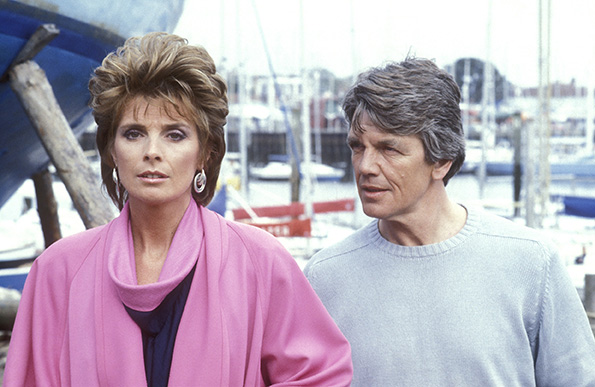Splice the mainbrace! Howards’ Way, the BBC’s Sunday night sailing and sex 80s soap, is back, courtesy of UKTV Play, with the whole first series now available to stream free with ads. Nearly 40 years on, I’ve found myself caught in its swell all over again.
The combination of corporate chicanery (Fry and Laurie’s ‘Damn you, Marjorie!’ sketches owe a lot to this) and sizzling sex on satin sheets is made all the more glorious because the backdrop isn’t the sun-drenched skyscrapers and rodeo ranches of Texas or Colorado but the village of Bursledon on the Hampshire coast, renamed Tarrant for the fiction. The sailing, and there’s a lot of sailing, all takes place on the river Hamble. Now, Bursledon is a pretty little place but its shortcomings as a glamour location are immediately obvious as episode one of Howards’ Way opens on the final stages of a thrilling yacht race taking place under grey, smeary skies.
It’s that amalgam of attempted glitz and homely reality that drew in millions of viewers to Howards’ Way over its six-year run. Like much of the best television, you can’t quite believe they had the nerve to make it. As I watched these opening episodes again I was instantly snared, thinking ‘My God, what tosh!’ and ‘Yeah, you tell him, Jan!’ simultaneously.
Howards’ Way is a kind and generous place, bound by family and community, where there’s a Leo to rescue every Abbi.
The inciting incident – draughtsman Tom Howard is made redundant and decides to become a freelance boatbuilder – is so low-concept in this age of she-hulks and alternate reality computer simulations that it now feels positively outré. His wife Jan is scandalised by what he’s done, and seems likely to fall into the greasy clutches of Ken Masters, the Andrew Tate of Eastleigh. (In these early episodes, Ken is paired with a bimbo who gets two lines a week, but who was shortly after to become known as Jeffrey Archer’s mistress, always referred to in the news as ‘Howards’ Way actress Sally Farmiloe’, to which the reaction from even the most hardened devotees was always ‘Who’?)
Tom’s son Leo is a reminder that my generation was once the unfathomably strange, socially concerned left-wing one (he wears a Greenpeace T-shirt and is obsessed by ‘foxes and fall-out’) before we all mysteriously became gammons somehow in about 2012. Then there is daughter Lynn, daddy’s girl and a keen sailor. You know she is a keen sailor because she employs nautical metaphors for everything – ‘mum and dad are cruising along steady now’, ‘it’ll soon blow over’. She even uses the Beaufort scale to measure the force of family squabbles. The only other youngster is miserable Abbi, who rather hilariously wanders through the background of the whole glamorous thing looking like boiled death, and throws herself into the rapids of the Hamble after three episodes. Luckily Leo is on hand to save her and convince her that a life of reef knots, sou’westers and lovely kitchens is worth living.
I’ve had to remind myself that these are the early, more grounded episodes before everybody starts up their own business, before housewife Jan instantly becomes an international high-end fashion designer for ‘The House Of Howard’, and before Kate O’Mara shows up at full pelt and at full décolletage as the head of a fibreglass conglomerate with the improbable trading name of Wilde Mouldings.
Where did this wonderful hokum come from? Interestingly, producer Gerard Glaister and script editor John Brason had worked as a team before on two-fisted PoW drama Colditz and on the incredibly tense and cynical French resistance wartime thriller, Secret Army. The final episode of Secret Army, written by Brason and set 20 years later, was pulled by the BBC before transmission. Nobody is quite sure exactly why, but I’ve seen it and it ends with a remarkably direct anti-Soviet statement addressed directly to camera, which would have gone out almost at the very moment Russian tanks were rolling into Afghanistan.
These were tough men from another age of television. Secret Army makes it very clear that Brason loathed socialism as much as he loathed Nazism. Glaister was a DFC who flew Lysanders back and forth throughout the war and had escaped occupied France disguised as a female German civilian. It is impossible to picture them doing karaoke at Soho House.
Howards’ Way is the peacetime world they dreamed of – a free market land fit for heroes, with businessmen and women taking risks and reaping the rewards. Contracts signed with celebratory cigars, busy manufacturing yards, share certificates in ‘Country Diary Of An Edwardian Lady’-branded notecases. It’s a kind and generous place, bound by family and community, where there’s a Leo to rescue every Abbi.
Looking back on it now, a word keeps swimming into my head as it does when I think of Margaret Thatcher: a word you don’t normally associate with her. Naive.
Thatcher thought that, given the chance, everyone would act like her dad, Alderman Roberts. Glaister and Brason thought Ken Masters was an unavoidable, acceptable cost for a free world to bear, and that heroes and rough diamonds would win out. But there aren’t enough aldermen or Howards in the world. Far too much energy and effort is required.
When politicians talk, as they still do, about dynamic entrepreneurial Britain – both Sunak and Starmer used the D word just last week – I scratch my head and wonder: where on earth is this nation, bursting with energy and productivity, that they’re referring to? Now I’ve realised. It’s the Britain you’ll find at the Mermaid Marina, Tarrant. Always there.







Comments